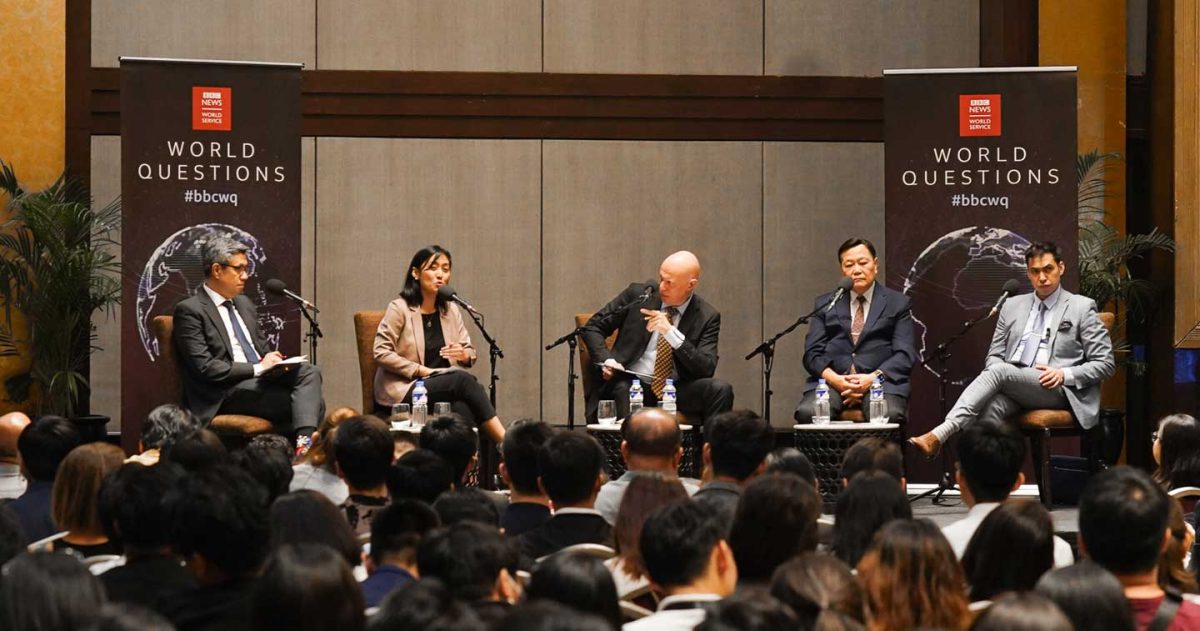MANILA, PHILIPPINES — Did you know that a fifth of the world’s trade goes through the South China Sea? That’s what Johnny Dymond, host of podcast BBC World Questions of BBC World Service said during the recorded-as-live broadcast of a debate on various issues deemed important by Filipinos at Diamond Hotel Philippines on March 05. The recording was aired at 8:00 pm (Philippine time) on Saturday, March 09.
Johnny facilitated what he referred to as “a large and lively audience” in a program “that puts people and their questions at the heart of the debate” on topics as varied as “Chinese aggression in the South China Sea (referred to by locals as the “West Philippine Sea”), constitutional reform, divorce laws, poverty, transport, and the record of (Philippine) President Bongbong Marcos.” He was accompanied by producer Helen Towner.
Among the distinguished members of the event’s panel were Justice Antonio Carpio, former Supreme Court judge, and an authority on the West Philippine Sea (WPS); Prof. Roberto Galang, the dean of the School of Management of the Ateneo de Manila University; Prof. Richard Heydarian of the University of the Philippines, who is also a columnist and writer; and Rafaela David, the president of the Akbayan Citizens Action Party, a progressive socialist movement.
Prior to asking for the opinions of the panel, Johnny said that “Looming over the nation is its powerful neighbor China and its claims to seas and resources that lie between the two countries.”
On the day of the recording, Chinese vessels harassed Filipino fishers, and this had been going on for years: “Years of clashes with China over the control and exploitation of this resource-rich sea”; albeit “the UN Tribunal ruled back in 2016 very clearly in the Philippines’ favor,” he said.
Carpio, who is recognized as an authority on the WPS/SCS said that he doesn’t see an immediate resolution to this “intergenerational” dispute. He said that “It’s very clear to everyone,” that China has claimed the high seas of the WPS/SCS as part of its national territory.
“This belongs to mankind; nobody owns (it). Members of the UN Convention of the Law of the Sea favor us overwhelmingly. Like-minded countries like UK, US, Canada, Australia, Japan, India, South Korea (support) us. But China is a nuclear power. They have the largest navy in the world. It will take time. This is a long struggle,” he said.
“Our fisherfolk communities are most affected by what China is doing (at the WPS),” Rafaela David noted. Comparing this struggle of the Filipino people to David in the Biblical story of David vs. Goliath, she said that ordinary Filipino citizens should show China that we “are not (going to) be bullied.”
“We are not alone in this fight. I think that’s something very encouraging and important. If our forefathers in the late 19th century founded the Philippine republic in opposition to the imperial Spanish and later the Americans, this is our chance to re-found our country. I think this is a crucial moment in our Philippine history. This is the struggle that’s defining us in many ways. Let us not fall for what I call ‘strategic gaslighting.’ China is blaming us for standing up to bullying. That is unacceptable. We should keep on fighting until we gain their grudging respect,” Prof. Richard Heydarian said, and added that “It’s a risk worth taking because that’s what a self-respecting nation would do.”
During his introduction to the broadcast, Johnny stated, “This is a fast-growing country with a large and a youthful population of just over 120 million people. Spread out across over (7,100) islands, a place of breathtaking beauty in Southeast Asia.” It is interesting that he described the city thus: “Here in Manila, towering hotels and gleaming skyscrapers sit alongside grinding poverty and congested highways.”
He stated, “Two years ago, a new president with a familiar surname was elected here. Ferdinand Marcos (Jr.) – known as Bongbong – son of the former president and dictator Ferdinand Marcos Sr….(was) swept to power on a national unity ticket on a pledge to boost the economy which was badly damaged by COVID.” He further said that “There is a lot that could go right here. It has a young and growing population in a region with collapsing birthrates. (Its) strong links to both America and China could make it a hub for trade and investment,” and lastly, “Critics say poor governance has undermined the nation’s potential. The region has (forged) ahead; the Philippines has fallen behind. The democratic checks and balance that other countries take for granted are missing here.”







On poverty, the need for higher wages, education and a grand plan
Towards the end of the forum, when quizzed as to what to them was the single most immediate concern or issue in the country, Justice Carpio replied “Poverty,” adding that there was a need to “raise the income of every Filipino” and that “it cuts across all issues.” This was supported by Rafaela David, who said, “We need higher wages. Productivity has increased by 60%” for over a decade,” but that “our wages stagnate.” She added that both houses of Congress are working on increasing wages of the Filipino people.
Richard picked education. He mentioned the Philippines’ dismal numbers in terms of literacy. “My god! We’ve got a big problem. We don’t have political education. We don’t have critical thinking.” He likened this to a “ticking time bomb; the most fundamental crisis that we (face).” He also expressed our lack of preparation for the waves of the future: artificial intelligence, climate change, “and what else is in store for us and humanity.”
His fellow academic Prof. Roberto Galang said that, apart from the need to be well-educated, “We need nutrition and health care. For us to grow and get out of poverty, we need healthy people. When you have healthy people, they can think, then they can create better jobs.” He said that food and shelter are very basic. Although one of the members of the 300-strong audience agreed with Roberto, citing “public health,” and the need to reform the system of the government’s welfare program, their ideas about the single most pressing issue of the day were: the need to “enhance our economic system,” to keep our people here so they could contribute to Philippine society, and so that they need not leave the country to become overseas Filipino workers (OFWs).
Another member of the audience opined that “the government (must) have a grand plan…to make the Philippines move faster.” The others felt the need to address disinformation because “the moment people cannot discern fact from delusion, they’ll start worshipping their own oppressors.” And still another mentioned “AI; whether we like it or not.”
On divorce, transport, ‘Bagong Pilipinas’ and charter change
Among the other major issues discussed during the forum were:
Divorce
Justice Carpio pointed out that while we “actually had a divorce law” during the American and Japanese regimes, and divorce is allowed among Muslims, it isn’t allowed among Catholics. Roberto said that there seems to be no sense of urgency to pass a divorce law – “according to the latest birth statistics – as majority of Filipinos (60%) are born out of wedlock.”
“What destroys the family is an abusive relationship that we Filipinos should be able to get out of,” said Rafaela. She added that Akbayan has been pushing for the divorce bill with the leadership of Senator Risa Hontiveros at the Senate.
Transport
Roberto lamented that “Our whole transportation system is outdated;” and we are “still reliant on a franchise system developed by a colonizer.”
Richard on the other hand pointed out the lack of a “coordinated centralized approach” in Metro Manila. He said it was insane that there was a lot of duplication taking place, like our multiple business districts, for instance, and how this was a very good reflection of our governance. He however cited that there was enough taxpayer’s money to fund a new subway, and that there are a lot of infrastructure projects are in the pipeline. He expressed that the administration of the late President Noynoy Aquino did not get enough credit for a lot of the infra projects that were started towards the tailend of his administration.
“I certainly agree that we have to increase… our public transport system, and we should (have) a formidable policy regarding that,” Richard said.
“We definitely need a transport policy that centers on moving people, and not cars,” said Rafaela. This was warmly received by resounding applause. She also expressed the wish that even with the country’s move towards investment for public transportation, greener technologies and a jeepney modernization program, that “(the jeepney drivers) would have the support mechanisms that will ensure that they can really transition in a just manner where everyone is considered.”
Bagong Pilipinas
“I really don’t know what (Bagong Pilipinas) means. When Ferdinand Marcos Sr., declared Martial Law, he said (he) will establish a new society. When he assumed office as president, the son said he will establish Bagong Pilipinas. Well, if this is the same as his father’s New Society, then (we’re) in for a terrible ride,” Justice Carpio said.
“What is really new that’s being offered by this new administration?” Rafaela asked. “We still see the similar problems we are hounded by the last.” She mentioned human rights violations, “record high levels of inflation,” among others. “This government still needs to show us what (new programs, new policies that will really change the lives of ordinary Filipinos,” she said.
Roberto is more hopeful. “Perhaps, we can use the geopolitical situation to attract investments from Japan, from the US, from the EU. Hopefully they could realize that we could be a mechanism for investment.”
Roberto added that “All of us survived the pandemic, primarily because of apps like Zoom. But most of these apps – like Netflix – are foreign. While the government has innovations here and there, they haven’t put in enough resources to get Filipino companies to disrupt digital payments, digital wallet, anything digital. We need to find a new pillar for the economy. Hopefully (the) Bagong Pilipinas slogan translates to new industries, new companies, new economies. That’s what we’re waiting for,” he said.
Rafaela however concluded that “We also need to come together as Filipinos and stop electing leaders who are subservient to the interests of China.”
Charter Change
Richard said that it was not true that investors weren’t coming in because of some issues with the provisions of the constitution: “It’s because of unpredictable corruption.” He added that “We should be open to some tweaking and some improvement to have a constitution for the 21st century needs of this country.”
“We have a very, very restrictive constitution,” Roberto pointed out. “These moves at not just changing the constitution but also the laws behind these (‘education, media, advertising, retail’) is very much overdue. It’s very hard to pass laws in this country. Many of our laws date back to the Commonwealth era.” He expressed the need to “find a way to make laws go faster.”
Akbayan had been campaigning against charter change because, according to Rafaela, “We believe that charter change is a dance of death for our Philippine democracy, primarily because it risks undermining our electoral democracy. They are using the constitution as a battleground for the petty squabbles of two dynasties (the Dutertes and Marcoses). It may be a trojan horse that would open up the floodgates, a can of worms, extend term limits; possibly even postpone the upcoming elections, and weaken other safeguards within the constitution.”
Justice Carpio said that “It is not necessary to change the constitution to lift economic provisions (or) restrictions to the constitution. We have one of the most liberalized investment laws in ASEAN, and even in Asia.” He said that “what they are proposing to change are…. voting requirements to amend or revise the constitution, which is political, because they want to convert the system to parliamentary, or they want to lift term limits.”
Listen to the episode in full at https://www.bbc.co.uk/sounds/play/w3ct59td








